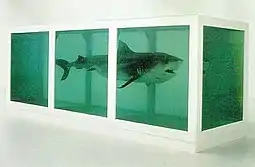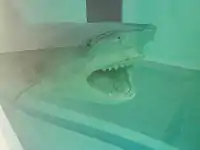The Physical Impossibility of Death in the Mind of Someone Living
The Physical Impossibility of Death in the Mind of Someone Living is an artwork created in 1991 by Damien Hirst, an English artist and a leading member of the "Young British Artists" (or YBA). It consists of a tiger shark preserved in formaldehyde in a vitrine. It was originally commissioned in 1991 by Charles Saatchi, who sold it in 2004 to Steven A. Cohen for an undisclosed amount, widely reported to have been at least $8 million. However, the title of Don Thompson's book, The $12 Million Stuffed Shark: The Curious Economics of Contemporary Art, suggests a higher figure.
| The Physical Impossibility of Death in the Mind of Someone Living | |
|---|---|
 | |
| Artist | Damien Hirst |
| Year | 1991 |
| Type | Tiger shark, glass, steel, 5% formaldehyde solution |
| Dimensions | 213 cm × 518 cm × 213 cm (84 in × 204 in × 84 in) |
Owing to deterioration of the original 14-foot (4.3 m) tiger shark, it was replaced with a new specimen in 2006. It was on loan to the Metropolitan Museum of Art in New York City from 2007 to 2010.[1]
It is considered an iconic work of British art in the 1990s,[2] and has become a symbol of Britart worldwide.[3]
Background and concept
The work was funded by Charles Saatchi, who in 1991 had offered to pay for whatever artwork Hirst wanted to create. The shark itself cost Hirst £6,000[4] and the total cost of the work was £50,000.[5] The shark was caught off Hervey Bay in Queensland, Australia, by a fisherman commissioned to do so.[4][5] Hirst wanted something "big enough to eat you".[6]


It was first exhibited in 1992 in the first of a series of Young British Artists shows at the Saatchi Gallery, then at its premises in St John's Wood, north London. The British tabloid newspaper The Sun ran a story titled "£50,000 for fish without chips."[7] The show also included Hirst's artwork A Thousand Years. He was then nominated for the Turner Prize, but it was awarded to Grenville Davey. Saatchi sold the work in 2004 to Steven A. Cohen for an estimated $8 million.[7]
Its technical specifications are: "Tiger shark, glass, steel, 5% formaldehyde solution, 213 × 518 × 213 cm."[8]
The New York Times in 2007 gave the following description of the artwork:
Mr. Hirst often aims to fry the mind (and misses more than he hits), but he does so by setting up direct, often visceral experiences, of which the shark remains the most outstanding.
In keeping with the piece's title, the shark is simultaneously life and death incarnate in a way you don't quite grasp until you see it, suspended and silent, in its tank. It gives the innately demonic urge to live a demonic, deathlike form.[1]
Decay and replacement
Because the shark was initially preserved poorly, it began to deteriorate, and the surrounding liquid grew murky. Hirst attributed some of the decay to the fact that the Saatchi Gallery had added bleach to the fluid.[7] In 1993, the gallery skinned the shark and stretched its skin over a fiberglass mould. Hirst commented, "It didn't look as frightening ... You could tell it wasn't real. It had no weight."[7]
When Hirst learned of Saatchi's impending sale of the work to Cohen, he offered to replace the shark, an operation which Cohen funded, calling the expense "inconsequential" (the formaldehyde process alone cost around $100,000).[7] Another shark (a female aged about 25–30 years, equivalent to middle age) was caught off the Queensland coast and shipped to Hirst in a 2-month journey.[7] In 2006, Oliver Crimmen, a scientist and fish curator at London's Natural History Museum, assisted with the preservation of the new specimen.[7] This involved injecting formaldehyde into the body, as well as soaking it for two weeks in a bath of 7% formalin solution.[7] The original 1991 vitrine was then used to house it.[7]
Hirst acknowledged that there was a philosophical question as to whether replacing the shark meant that the result could still be considered the same artwork. He observed:
It's a big dilemma. Artists and conservators have different opinions about what's important: the original artwork or the original intention. I come from a conceptual art background, so I think it should be the intention. It's the same piece. But the jury will be out for a long time to come.[7]
Variants
Hirst has made other works subsequently which also feature a preserved shark in formaldehyde in a vitrine. In September 2008, The Kingdom, a tiger shark, sold at Hirst's Sotheby's auction, Beautiful Inside My Head Forever, for £9.6 million (more than £3 million above its estimate).[9]
Hirst has made a miniature version of The Physical Impossibility of Death in the Mind of Someone Living for the Miniature Museum in the Netherlands. In this case he put a guppy in a box (10 × 3.5 × 5 centimetres) filled with formaldehyde.[10]
Responses
.jpg.webp)
In 2003, under the title A Dead Shark Isn't Art, the Stuckism International Gallery exhibited a shark which had first been put on public display two years before Hirst's by Eddie Saunders in his Shoreditch (London) shop, JD Electrical Supplies.[11] The Stuckists suggested that Hirst may have got the idea for his work from Saunders' shop display.[12]
In a speech at the Royal Academy in 2004, art critic Robert Hughes used The Physical Impossibility of Death in the Mind of Someone Living as a prime example of how the international art market at the time was a "cultural obscenity". Without naming the artwork or the artist, he stated that brush marks in the lace collar of a painting by Velázquez could be more radical than a shark "murkily disintegrating in its tank on the other side of the Thames".[13]
The 2009 British-Hungarian film The Nutcracker in 3D features a scene in which a pet shark is electrocuted in a water tank, which director Andrei Konchalovsky cites as a reference to Hirst's artwork.[14]
Hirst's response to those who said that anyone could have done this artwork was, "But you didn't, did you?"[6]
Notes and references
- Smith, Roberta (16 October 2007). "Just When You Thought It Was Safe". The New York Times. Retrieved 16 October 2007.
- Brooks, Richard. "Hirst's shark is sold to America", The Sunday Times, 16 January 2005. Retrieved 14 October 2008.
- Davies, Serena. "Why painting is back in the frame", The Daily Telegraph, 8 January 2005. Retrieved 27 November 2016.
- Davies, Kerrie (14 April 2010). "The great white art hunter". The Australian. Retrieved 14 April 2012.
- "Saatchi mulls £6.25m shark offer", BBC. Retrieved 23 February 2007
- Barber, Lynn "Bleeding art", The Observer, 20 April 2003. Retrieved 1 September 2007.
- Vogel, Carol "Swimming with famous dead sharks,2 The New York Times, 1 October 2006. Retrieved 23 February 2007
- "Damien Hirst", The Artchive. Retrieved 23 February 2007
- Akbar, Arifa. "A formaldehyde frenzy as buyers snap up Hirst works", The Independent, 16 September 2008. Retrieved 16 September 2008.
- "Guppy, formaldehyde" Miniature Museum. Retrieved 26 December 2011. Archived 26 April 2012 at the Wayback Machine
- Alberge, Dalya. "Traditionalists mark shark attack on Hirst", The Times, 10 April 2003. Retrieved 6 February 2008.
- "A Dead Shark Isn't Art" on the Stuckism International web site Retrieved 21 September 2008
- Kennedy, Maev "Art market a 'cultural obscenity'", The Guardian, 3 June 2004. Retrieved 1 September 2007.
- Zeitchik, Steven. "Andrei Konchalovsky builds a strange maze with The Nutcracker in 3D", Los Angeles Times, 26 November 2010. Retrieved 3 December 2016.
External links
- Official Damien Hirst website
- Smarthistory – Hirst's Shark: Interpreting Contemporary Art, video, Beth Harris, Sal Khan and Steven Zucker commentators, 7:49
